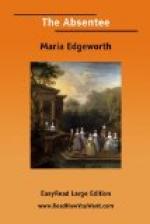Our hero was glad to have an opportunity of seeing more of a species of fine lady with which he was unacquainted.
The invitation was verbally made, and verbally accepted; but the lady afterwards thought it necessary to send a written invitation in due form, and the note she sent directed to the most right honourable the Lord Viscount Colambre. On opening it he perceived that it could not have been intended for him. It ran as follows:
My dear Juliana O’LEARY, I have got a promise from Colambre, that he will be with us at Tusculum on Friday the 20th, in his way from the county of Wicklow, for the collation I mentioned; and expect a large party of officers; so pray come early, with your house, or as many as the jaunting-car can bring. And pray, my dear, be elegant. You need not let it transpire to Mrs. O’G—; but make my apologies to Miss O’G—, if she says anything, and tell her I’m quite concerned I can’t ask her for that day; because, tell her, I’m so crowded, and am to have none that day but real quality.—Yours ever and ever, Anastasia Raffarty. P.S.—And I hope to make the gentlemen stop the night with me; so will not have beds. Excuse haste, and compliments, etc. Tusculum, Sunday 15.
After a charming tour in the county of Wicklow, where the beauty of the natural scenery, and the taste with which those natural beauties had been cultivated, far surpassed the sanguine expectations Lord Colambre had formed, his lordship and his companions arrived at Tusculum, where he found Mrs. Raffarty, and Miss Juliana O’Leary, very elegant, with a large party of the ladies and gentlemen of Bray, assembled in a drawing-room, fine with bad pictures and gaudy gilding; the windows were all shut, and the company were playing cards with all their might. This was the fashion of the neighbourhood. In compliment to Lord Colambre and the officers, the ladies left the card-tables; and Mrs. Raffarty, observing that his lordship seemed partial to walking, took him out, as she said, ‘to do the honours of nature and art.’
His lordship was much amused by the mixture, which was now exhibited to him, of taste and incongruity, ingenuity and absurdity, genius and blunder; by the contrast between the finery and vulgarity, the affectation and ignorance of the lady of the villa. We should be obliged to stop too long at Tusculum were we to attempt to detail all the odd circumstances of this visit; but we may record an example or two which may give a sufficient idea of the whole.
In the first place, before they left the drawing-room, Miss Juliana O’Leary pointed out to his lordship’s attention a picture over the drawing-room chimney-piece. ‘Is not it a fine piece, my lord?’ said she, naming the price Mrs. Raffarty had lately paid for it at an auction.—’It has a right to be a fine piece, indeed; for it cost a fine price!’ Nevertheless this fine piece was a vile daub; and our hero could only avoid the sin of flattery, or the danger of offending the lady, by protesting that he had no judgment in pictures.




